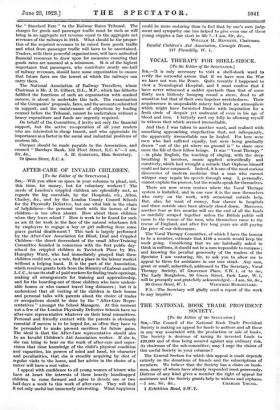AFTER-CARE OF INVALID CHILDREN.
[To the Editor of the SPECTATOR.]
you allow us space in your columns to plead, not, this time, for money, but for voluntary workers ? The needs of London's crippled children are splendidly met, as regards the big essentials, by the Hospitals, viz., Alton, Chailey, &e., and by the London County Council Schools for the Physically Defective, but one vital link in the chain of helpfulness—the personal touch with the homes of the children—is too often absent. How about those children when they leave school ? How is work to be found for such as are fit for work in the face of the natural reluctance felt by employers to engage a boy or girl suffering from some grave partial disablement ? This task is • largely performed by the After-Care Association for Blind, Deaf and Crippled Children—the direct descendant of the small After-Training Committee founded in connexion with the first public day- school for crippled children in Tavistock Place by Mrs. Humphry Ward, who had immediately grasped that these children could not, as a rule, find a place in the labour market without a helping hand. It is the part of the Association, which receives grants both from the Ministry of Labour and the L.C.C., to use its staff of paid workers for finding trade openings, making all arrangements for training and apprenticeship, and for the boarding-out of those children who have undesir- able homes or who cannot travel long distances ; but it is understood that all visiting of the children in their homes and personal talks with parents about the choice of trades or occupations should be done by the " After-Care Repre- sentatives " amongst the School Managers. At this moment rot a few of the London Physically Defective Schools have no after-care representative whatever on their local committees. Personal and friendly contact with the parents is obviously essential if success is to be hoped for, as often they have to be persuaded to make present sacrifices for future gains. The ideal is that the After-Care representative should also be an Invalid Children's Aid Association worker. If she is, she can bring to bear on the work of after-care and super- vision that close knowledge of the child's physical condition and capacities, his powers of mind and hand, his character and peculiarities, that she is steadily acquiring by dint of regular visits to the home, and her advice in the choice of a career will have a real value.
I appeal with confidence to all young women of leisure who have at heart the interests of these heavily handicapped children to come forward and agree to devote one or two half-days a week to this work of after-care. They will find it not only useful but immensely interesting. What happiness could be more enduring than to feel that by one's own judg. ment and sympathy one has helped to give even one of these young cripples a fair start in life Y—I am, Sir, &c., WILLIAM H. BENNETT, Chairman.. Invalid Children's Aid Association, Carnegie House, 117 Piccadilly, W. 1.










































 Previous page
Previous page